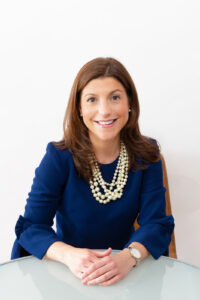Shortly after 9/11, Lauren Pedi ’19 stopped at her local hospital to ask about volunteer opportunities. She had recently moved from Detroit to Chicago—where her family was from—to work full-time at an architecture firm.
She was thankful for the job, given the current climate, but felt like something was missing. Maybe spending time in a medical setting would satisfy her desire for rewarding work.

Instead of becoming a volunteer, however, she ended up meeting someone in the development office. Shortly after, Pedi landed a job at Advocate Illinois Masonic Medical Center as a development coordinator—and she loved it.
“I learned a little about everything,” she says, “from major gifts fundraising to event planning and stewarding donors. So much was transferrable from my time as a communication major at University of Michigan-Dearborn because so much was about relationship building and connecting with people.”
Four years later, she joined Lurie Children’s Hospital of Chicago to work with volunteer boards and fundraise for special events. At the time, the hospital had just announced plans for a 22-story, state-of-the-art medical center, slated to open in 2012: Pedi would be part of the team tasked with raising $600 million for the campaign.
“It was a really fun, rewarding, and memorable experience. We worked hard. We played hard. We had 30 events in 30 days, and we loved every minute of it,” she says. The experience also solidified her desire to use her skills to support groundbreaking work in healthcare.
In January 2014, Pedi left the team to move into major gift fundraising; she joined Northwestern’s Feinberg School of Medicine to raise money for the Institute for Translational Neurosciences and its work on Alzheimer’s, Parkinson’s, and ALS.
“I knew the fundamentals would not only help me in my job today but also in the rest of my career—no matter where I went.”
As she helped support this research, she decided it was time to explore a master’s program. After talking to colleagues, doing research, and attending information sessions, she discovered Northwestern’s MS in Communication program.
Pedi admits she was scared to return to the classroom after being out of school for nearly two decades, but her “colleagues spoke very highly of it,” she explains. “As a one year program, it seemed very approachable. And I knew the fundamentals would not only help me in my job today but also in the rest of my career—no matter where I went.”
Earning an MS in Communication gave her the opportunity and the confidence to put her skills to the test. For starters, she purposely chose an elective that she knew would be uncomfortable—but would pay off in the end: Professor Paul Arntson’s Leadership & Decision-Making class.
“You’re videotaped as you lead a group through a decision-making process based on an analysis of a business case study,” she explains. “Then you and the members of your team go back and evaluate how you did. When I first heard about it, I didn’t think I could ever do it. But I joined the program because I wanted to learn and push myself, so I decided to go for it.”
That confidence carried over into her work, too. While at the Feinberg School of Medicine, Pedi had agreed to share what she was learning in the program and lead the charge on a new project: finding meaningful ways to engage donors. After coming up with a plan, she took her team’s proposal to senior leadership and they moved forward. “I had the confidence to lead this small group through this process and present our ideas to leadership because of the experiences I had during the program,” she explains.
As graduation approached, Pedi planned to take a few months off and re-evaluate next steps. But after lunch with a former Lurie Children’s Hospital colleague, she learned about an open fundraising position within the neurosciences program.
She returned to the hospital in November 2019 as a senior major gift officer, where she raises funds for the Division of Neurology and Division of Neurosurgery, among other areas.
Today, Pedi still reaps the benefits of her MS in Communication. Working with doctors, scientists, administrators, and donors, she says her job can be challenging as she breaks scientific and medical information into understandable messages to motivate donors.
“The program gave me the confidence to ask questions and probe deeper with doctors and scientists to get at the heart of their work and how it translates into something meaningful for donors,” she says. “It helps me do my job more effectively and successfully.”